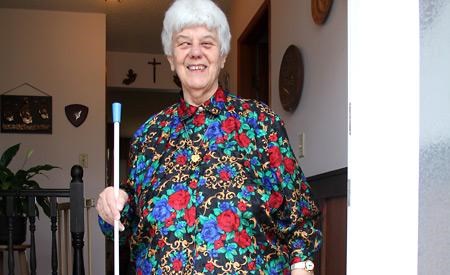White Cane Week, Sunday, February 5 to Saturday, February 11, is giving the Canadian Council of the Blind (CCB) Powell River chapter an opportunity to remind people of small efforts that can make a difference in the life of the blind.
The purpose of White Cane Week is to make the public aware of the difficulties faced by people who are losing or have lost their vision. Geraldine Braak, president of the chapter, said that in general people are not aware of the prevalence of blindness or of the difficulties people with vision problems face. Most of all though people are not aware of the small changes that can be made to make the community more accessible for the blind.
Most people who are blind are either born blind or have become blind as the result of an accident. Some become blind due to illness but that is becoming rarer with advances in medical treatments. She estimates there are probably close to 100 people in Powell River with visual impairments of some sort and two or three who are completely blind.
One thing that individuals can do when out in the community is stop and talk to a person they know has impaired vision rather than just saying “hi” as they pass. Braak said that lots of people assume you will recognize their voice but that is often not the case.
“Don’t just say ‘hi’ and keep going because that person has no idea whether they were talked to or not,” said Braak.
Small alterations in businesses and public places would also make them more accessible for the blind. For example, Braak said that normally if a business has double doors the right door is typically for entry and the left is used to exit. In some businesses this is not the case, however, which can make life difficult and potentially dangerous for those with impaired vision. Automatic doors are even better, said Braak.
“What we are really trying to show people is the little things that they do not realize impact lives,” said Braak.
White Cane Week started in Canada in 1946 and has been in Powell River since 1976, when the CCB chapter started up in the community. CCB is a consumer organization focused on advocacy and changes in policy. The Canadian National Institute for the Blind (CNIB) is a charity that delivers support services to people with visual impairments as well as providing advocacy, research and education. The two agencies are interrelated but separate.
CCB makes the argument that the white cane is “a symbol of ability, not disability.” Braak agrees and said it’s a shame some people avoid using the cane because they are embarrassed by it.
“It is really a badge of courage to actually trust yourself to that cane to tell you where you are and what you’re doing,” said Braak. “It is important that people realize the importance of the white cane. Not only the ones that need to use it but the public as well.”
On Friday, February 24, CCB will host a Vision and Blindness Awareness Day in Powell River Town Centre Mall from 10 am to 4 pm, an event of a scale that Braak said only happens every once in 10 or 15 years. On that day City of Powell River Mayor Dave Formosa, city councillors, RCMP members, Powell River Fire Rescue members and even the Peak’s own Joyce Carlson will be blindfolded and led through obstacle courses and challenges to demonstrate the difficulties of being blind. Some will even be taken out grocery shopping to get the full experience of being out in the world when you have no sight.
The obstacle challenges will take place from about 1 to 4 pm. CNIB will also be at the event demonstrating products that are available for people with vision impairments, such as talking watches and book readers. Representatives from CNIB and CCB will be on hand to talk with people and answer any questions. All are welcome to the event to learn about blindness.
“I think that it’s important, that it is a rare opportunity for [people] to come,” said Braak. “We’d really like them to come and ask questions, not just stand there, so that we can help.”



